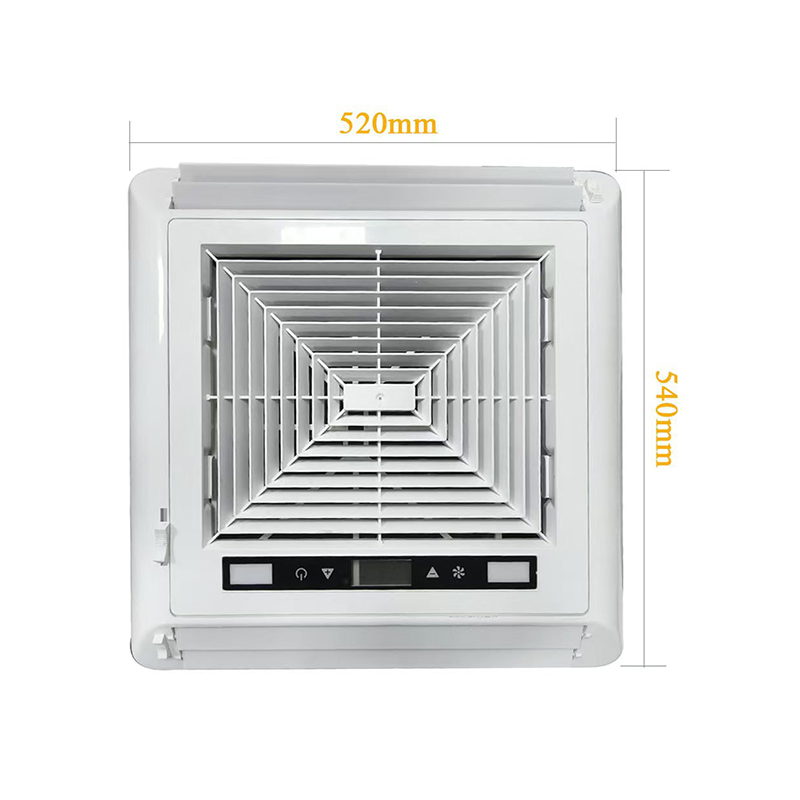Power Supply and Energy Requirements

One of the obvious differences between 12V air conditioners and other AC-powered units lies in their power supply characteristics.
Voltage and current type
12V air conditioners operate on low-voltage DC, which is compatible with vehicle or solar battery systems. Standard home or commercial air conditioners typically use AC power at higher voltages such as 110V, 220V, or 240V. The difference in voltage and current type affects the way energy is delivered and regulated.
Energy consumption
12V systems are generally designed for efficiency due to limited energy availability, especially in mobile or off-grid situations. They draw lower amounts of current compared to higher-power AC units, which allows them to operate from car batteries or auxiliary power systems without rapidly depleting the energy source. Conversely, conventional AC air conditioners rely on stable grid power, allowing them to consume higher energy for greater cooling output.
Compatibility with renewable sources
12V air conditioners can often be connected to solar panels or portable battery systems, making them suitable for mobile applications or locations without grid access. For instance, RV owners often use 12V air conditioners powered by a solar array during camping trips. Standard AC units, however, require direct connection to the electricity grid or a generator to function effectively.
These differences highlight how power requirements influence both the intended usage environment and operational flexibility of air conditioning systems.
Performance and Cooling Capacity
The cooling performance of 12V air conditioners differs from that of conventional AC units due to limitations in power and design.
Cooling output
12V air conditioners usually provide lower cooling capacity, suitable for small spaces such as car interiors, RV cabins, or compact rooms. For example, a 12V unit may cool a 3–5 cubic meter area effectively, while a conventional AC unit can manage entire rooms or larger living spaces.
Compressor type
Many 12V systems use more compact or variable-speed compressors that operate efficiently at lower voltages. This contrasts with AC-powered units that can utilize larger, high-power compressors to achieve faster and more uniform cooling.
Operation duration and limitations
Due to battery dependency, 12V air conditioners may be limited in operation time before recharging is required. Prolonged operation in hot conditions may reduce performance as battery voltage drops. AC air conditioners do not face this limitation when connected to a stable grid supply, enabling continuous operation regardless of environmental conditions.
Energy efficiency
While 12V units prioritize energy efficiency to preserve battery life, conventional AC units often focus on higher cooling capacity rather than energy draw. This affects the choice of unit depending on whether mobility or sustained indoor cooling is the priority.
Design and Installation Considerations
The intended use environment and installation requirements differ between 12V and conventional AC air conditioners.
Compactness and portability
12V air conditioners are designed to be compact, lightweight, and portable, which allows installation in vehicles, boats, or temporary setups. Conventional AC units, including window or split systems, are larger, heavier, and intended for permanent installation in homes or commercial buildings.
Installation flexibility
12V units often require minimal installation, sometimes operating as standalone units with simple connections to a battery or power inverter. AC-powered units require professional installation, wiring to mains electricity, and sometimes the addition of refrigerant lines or ductwork.
Maintenance and servicing
12V air conditioners generally have simpler systems to facilitate ease of maintenance, suitable for mobile users who may not have access to professional service regularly. Conventional AC systems may involve more complex components, including large compressors and condensers, requiring specialized servicing and tools.
These design and installation differences reflect the intended environments and mobility considerations, making 12V units more suitable for temporary or mobile applications and AC units more appropriate for stationary, large-scale cooling needs.